Candid with Bhanu Gupta
Candid with Bhanu Gupta
“The handicap of Deafness is not in the ear, but in the mind”
We are back again with yet another article in our ‘Wall of Fame’ series. Celebrating the International Week of the Deaf, we get candid with Mrs. Bhanu Gupta on her beautiful journey with her child, Khwaish Gupta, who is hard of hearing. In this bare-the-heart interview, Mrs. Bhanu elaborates on her perceptions and learnings of the Deaf Community and spreads light of positivity.
Please introduce yourself to our readers.
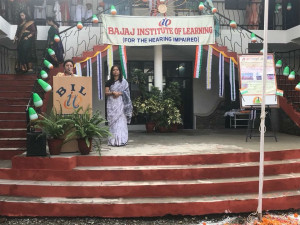 I am Mrs Bhanu Gupta special Educator with children with hearing impairment and counsellor for children with disabilities and for parents of special children. When my daughter Khwaish was identified as a deaf child, my parents and In laws stood by me rock solid but it was on insistence and support of my husband Col. Munendra Gupta that I pursued my career in special education. My mentor Mrs. Anjali Agarwal literally forced me to take up the job as a special educator in Bajaj Institute Of Learning For The Deaf and here I am!
I am Mrs Bhanu Gupta special Educator with children with hearing impairment and counsellor for children with disabilities and for parents of special children. When my daughter Khwaish was identified as a deaf child, my parents and In laws stood by me rock solid but it was on insistence and support of my husband Col. Munendra Gupta that I pursued my career in special education. My mentor Mrs. Anjali Agarwal literally forced me to take up the job as a special educator in Bajaj Institute Of Learning For The Deaf and here I am!
What were your perceptions on deafness as a condition initially?
Initially I never really thought about deafness as a condition. Like any layman I also had a mis-conception that the only problem was hearing and all deaf can speak and read naturally like hearing people. I basically lacked empathy and the phrase “deaf and dumb” seemed very natural.
How did your perceptions evolve over time?
Like I said, I had never pondered much on deafness as a condition till I faced the challenge as a mother it changed my view and I started working on deafness as a condition which had more to it than just the “cannot hear” cliche. Over the time my perception has changed tremendously and it has been a long journey from looking at deafness as a handicap to understanding it as a condition.
Can you share with us your major learning experiences with Khwaish?
Khwaish is the reason for me being me. I give full credit of what I am today to both my children Khwaish and Harshvardhan. The have taught me on striking a balance in giving the same upbringing and instilling the same ethos , values and virtues in both a hearing and a deaf child. This process was both challenging and rewarding at the same time. I started learning sign language for Khwaish and with Khwaish, my expressions, body language improved majorly. All the experiments I did to teach Khwaish are now what I use as tools with my other deaf students.
Please describe your journey and connection with the Deaf community?
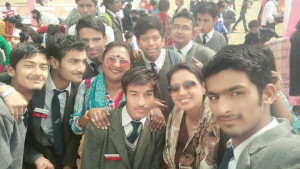 My first encounter with deaf was with my maternal aunt’s brother in law and his wife. As a young girl of 10 years I did not understand the gravity. My interaction with them would be a formal hello and then avoid interacting with them. My journey has been a roller coaster with its own highs and lows but mostly rewarding. Deaf are a linguistic minority with a hidden disability and therefore they don’t get attention immediately. But as much as I’ve known them, Deaf are very warm hearted loving sensitive and ever willing workers. I have personally seen that with provision of interpreters deaf can do almost any job and I have observed that the main barriers to employment arises from an inaccessible work environment rather than an inability to hear.
My first encounter with deaf was with my maternal aunt’s brother in law and his wife. As a young girl of 10 years I did not understand the gravity. My interaction with them would be a formal hello and then avoid interacting with them. My journey has been a roller coaster with its own highs and lows but mostly rewarding. Deaf are a linguistic minority with a hidden disability and therefore they don’t get attention immediately. But as much as I’ve known them, Deaf are very warm hearted loving sensitive and ever willing workers. I have personally seen that with provision of interpreters deaf can do almost any job and I have observed that the main barriers to employment arises from an inaccessible work environment rather than an inability to hear.
What is your take on sign language as a mode of communication? Can you share a few inspirational experiences while working with parents and individuals using sign language?
I believe that if acquired well in time, sign language enables deaf children to have full communication with people improving their cognitive and social skills. It draws upon the principle of basic human rights in relation to language acquisition at birth. For deaf sign language is a vital linguistic means of conveying thoughts, ideas and emotions. It is a fully operational language which fulfills all features to serve as a language, so it is an utmost important means of communication.
There is one incident that I would like to mention here about eight years ago a boy aged 10. He hailed from Bareilly and when he joined school, he had no exposure to school and sign language. When he came to me he was very hyper and very upset about the fact that no one understood him. We taught his mother sign language and when he went home for his winter break, his mom called me up to tell me that for the first time her son had expressed his choice over the vegetable he wanted to eat and she had understood him! Her joy knew no bounds. Parents come to me with a lot of hope and expectations which on to my responsibility and gives me the much needed push to move on. Every case is a new battle which I have to fight and emerge as a winner both for myself and more so for the parents.
Tips or messages that you would like to share with other parents and caregivers of differently abled children and individuals.
To all the parents, hats off to you and the caregivers. You are truly God’s own people. There is nothing termed ‘normal’ as such. Never give up on your child. Instill the ‘never say die’ attitude in your children. Evolve with ‘I won’t do it’ to ‘I can do it’. Enjoy to the fullest because if you are happy you will surely raise happy confident children. In every situation smile because test of fire makes finer steel. I truly agree that handicap of deafness is not in the ear but in the mind. And their abilities are much stronger than their disabilities. Stay blessed stay happy.
A truly inspiring read indeed! We, at 1SpecialPlace wish Mrs. Bhanu Gupta and her family the very best in all future endeavors.
- Chandrakant Vishwakarma helping the world hear better! - May 8, 2019
- Candid with Bhanu Gupta - September 29, 2018
- In Conversation With Dr. Sonali Kataria - September 26, 2018


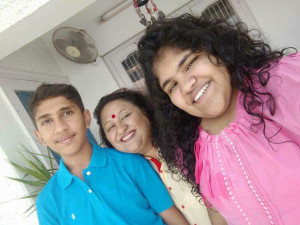
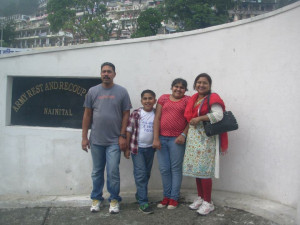
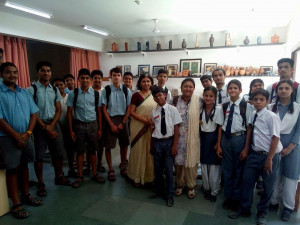
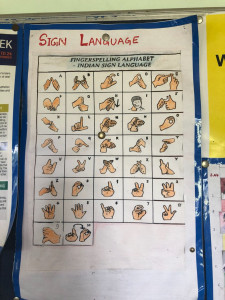
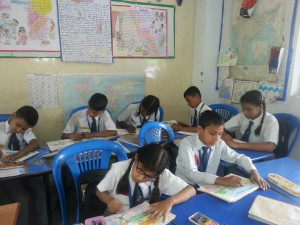
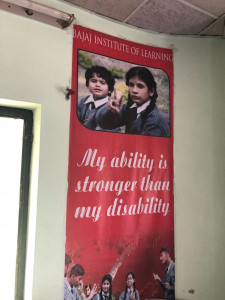
Leave a Comment
(0 Comments)